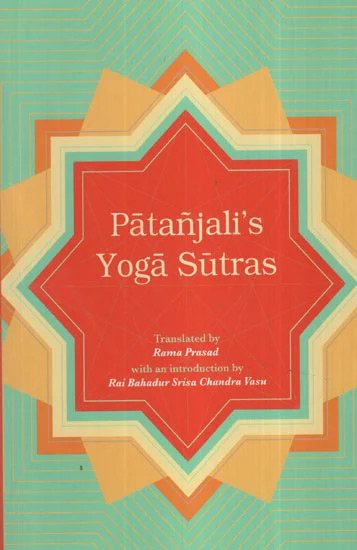Yoga-sutras (with Vyasa and Vachaspati Mishra)
by Rama Prasada | 1924 | 154,800 words | ISBN-10: 9381406863 | ISBN-13: 9789381406861
The Yoga-Sutra 1.18, English translation with Commentaries. The Yoga Sutras are an ancient collection of Sanskrit texts dating from 500 BCE dealing with Yoga and Meditation in four books. It deals with topics such as Samadhi (meditative absorption), Sadhana (Yoga practice), Vibhuti (powers or Siddhis), Kaivaly (isolation) and Moksha (liberation).
Sūtra 1.18
Sanskrit text, Unicode transliteration and English translation of Sūtra 1.18:
विरामप्रत्ययाभ्यासपूर्वः संस्कारशेषोऽन्यः ॥ १.१८ ॥
virāmapratyayābhyāsapūrvaḥ saṃskāraśeṣo'nyaḥ || 1.18 ||
virāma—of cessation, pratyābhāsa—the notion. pūrvaḥ—the former, the proceeding, all the three together means having for its preceding the notion of cessation, preceded by the notion of cessation. Saṃskāra śeṣaḥ—in which remain only the (śeṣa) residual potencies or impressions (saṃskāra). anyaḥ—the other.
18. Preceded by the constant repetition of the notion of cessation is the other; in which the residual potencies only remain.
The Sankhya-pravachana commentary of Vyasa
[English translation of the 7th century commentary by Vyāsa called the Sāṅkhya-pravacana, Vyāsabhāṣya or Yogabhāṣya]
[Sanskrit text for commentary available]
What now are the means and the nature of the ultra-cognitive trance? “Preceded by constant repetition of the notion of cessation is the other in which the residual potencies only remain.”
The ultra-cognitive trance is that state of mental restraint, in which all its modifications cease from action and remain only in posse. Its means is the Higher desirelessness.
Inasmuch as any form of practice having an objective phenomenon for its basis, cannot become the means of achieving it, the notion of cessation which is nothing substantial, is here made the basis; and that is devoid of any objective phenomenon. By the constant repetition of this notion, the mind having no object to grasp, becomes as it were, non-existent. The trance being thus seedless, is the ultra-cognitive.
The Gloss of Vachaspati Mishra
[English translation of the 9th century Tattvavaiśāradī by Vācaspatimiśra]
The commentator asks a question to introduce the ultra-cognitive, whose discussion is now in order:—‘What now, &c.’
“Preceded by the constant repetition of the notion of cessation is the other, in which the residual potencies only remain.”
The words, ‘preceded by the constant repetition of the notion of cessation,’ show the means; the remaining words describe the’ nature. The words, ‘in which the residual potencies only remain,’ are explained as, ‘in which all its modifications cease, &c,’
The words, ‘preceded by the constant repetition of the notion of cessation,’ are explained by the words, ‘Its means is the Higher desirelessness.’
Cessation is the absence of mental modifications. Its notion is the cause. Its practice consists in its repetition over and over again. That which this repetition precedes is described as such.
Now he says why the lower desirelessness does not become the cause of restraint (nirodha):—‘Inasmuch as any form of practice having an objective phenomenon as its basis, &c.’
The cause must be of the same class as the effect, not of a contrary class. The desirelessness which has an objective phenomenon for its basis is contrary to the effect; the trance, that is to say, which has no object for its basis. It is therefore proper that it should be born only from a cause which has no objective phenomenon for its basis, the mere light, that is to say, of spiritual knowledge. It is only the trance known as the Cloud of Virtue, born as it is from the pure essence of the Will-to-know with the impurities of the rajas and the tamas entirely removed, and the objects thereof left behind, that is infinite, sees the defects of objects and having given them all up, stands in its own nature, that can properly become the cause, as having no object for its basis, of the seedless trance, in which the residual potencies only remain; because they are similar in nature.
‘Is made the basis’:—is made dependent upon that.
Becomes as it were non-existent:—because it does not produce any effect in the shape of mental modifications.
The seedless is that which has no object for its basis. Or, it may be said that the seed consists of the vehicles of afflictions and actions. This is said to be the seedless, because the afflictions and actions have gone out of it.
